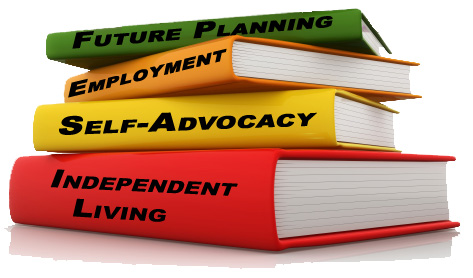Students graduating from high school often face a future that has more questions than answers. For students with disabilities, the future can be even more uncertain. Transition planning helps students with disabilities, and their families, prepare for the transition into adult life after graduation from high school.
Transition Specialists work with school Special Education staff and students in Resource Programs to help implement a successful transition from school to the adult world. The Transition Specialist is directly responsible for assisting with transition plans for students with special needs. These responsibilities may include program planning, coordinating, monitoring, evaluating, educating, implementation, and public relations.
Definition of Transition Services
 Transition Services is defined as a coordinated set of activities for students with a disability. It is designed to be within a results-oriented process focused on improving the academic and functional achievement of the child with a disability to facilitate the child's movement from school to post-school activities including post-secondary education, vocational training, integrated employment (including supported employment), continuing and adult education, adult services, independent living, or community participation. It is based upon the individual student's needs, taking into account the child's strengths, preferences, and interests; and includes instruction, related services, community experiences, the development of employment and other post-school adult living objectives, and, when appropriate, acquisition of daily living skills and a functional vocational evaluation.
Transition Services is defined as a coordinated set of activities for students with a disability. It is designed to be within a results-oriented process focused on improving the academic and functional achievement of the child with a disability to facilitate the child's movement from school to post-school activities including post-secondary education, vocational training, integrated employment (including supported employment), continuing and adult education, adult services, independent living, or community participation. It is based upon the individual student's needs, taking into account the child's strengths, preferences, and interests; and includes instruction, related services, community experiences, the development of employment and other post-school adult living objectives, and, when appropriate, acquisition of daily living skills and a functional vocational evaluation.
On-Line Trainings
09-26-18 - COPS On-Line Training with EDITS Trainer - Lisa Lee
09-13-19 - Morning session: Transition-Based IEP Training
09-13-19 - Afternoon session: Transition-Based IEP Training